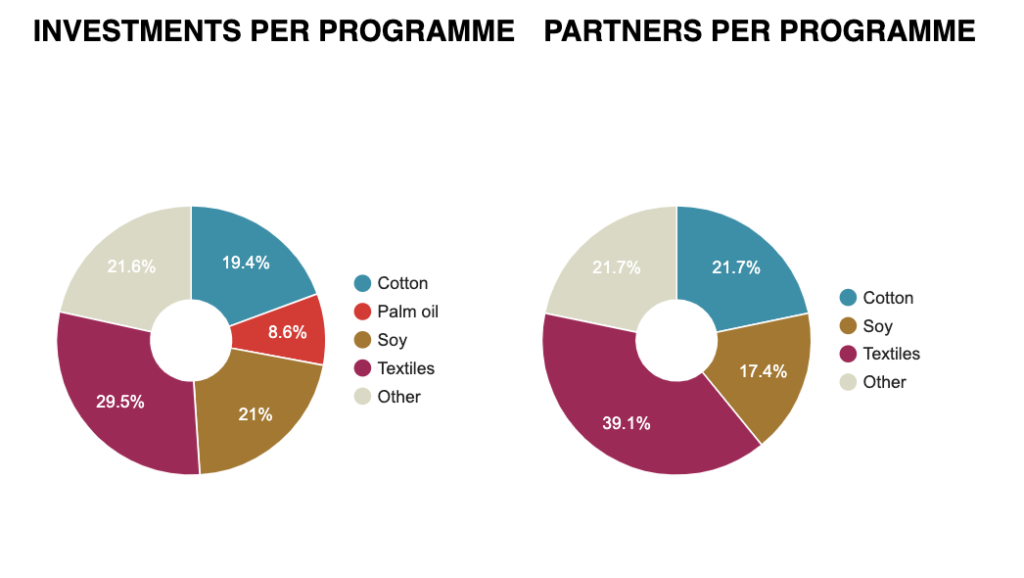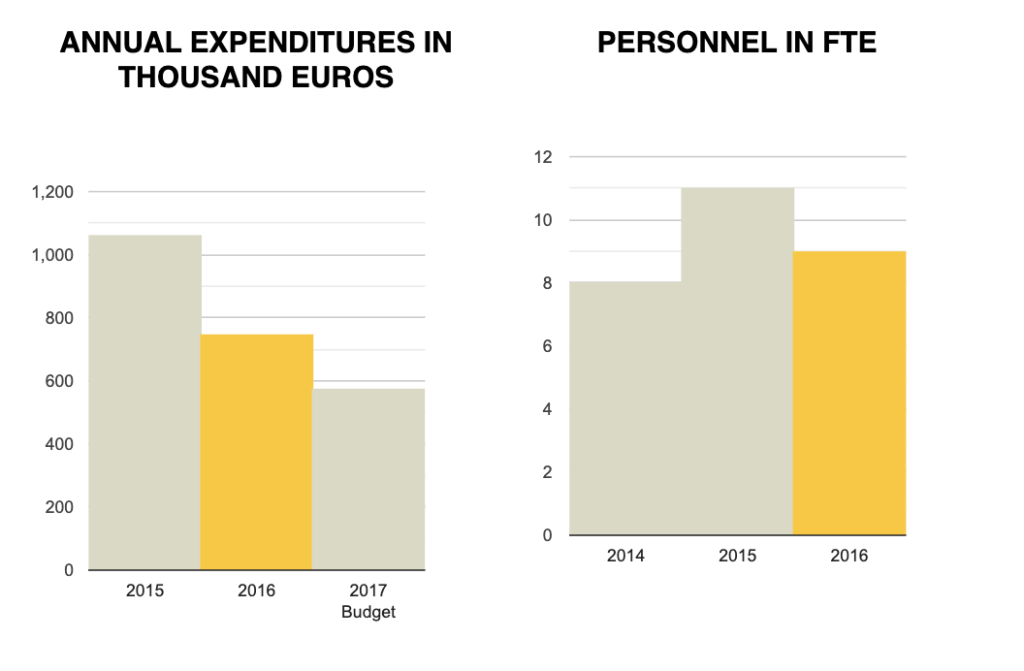REGIONAL COMMODITY PROGRAMMES
With support from VF Corporation, Solidaridad trained 1,940 farmers (including 921 women) in good agriculture practices. A total of 717 hectares of land is now managed responsibly and 968 tons of BCI verified lint cotton was produced in Hebei province. Solidaridad will gradually hand over the Hebei smallholder farmer project in 2017 to the local partner, Yunde Mianye Gin, who will independently continue the project implementation.

As part of the China Sustainable Palm Oil Working Group, Solidaridad, along with the China Vegetable Oils Associations, co-hosted the Third China Roundtable on Sustainable Palm Oil (RSPO) at the Dutch embassy in Beijing. Over 40 stakeholders attended the event to discuss the crucial steps needed to achieve sustainable palm oil for China, Indonesia and the Netherlands. In November, Solidaridad led a delegation of Chinese palm oil buyers, including COFCO, Sinograin, Wilmar-China, Fangshun and Julong, on a learning visit to Indonesia.

Solidaridad along with the Paulson Institute, TNC and WWF-US jointly launched the Sustainable Soy Trade Platform (SSTP) to facilitate in cross-regional collaboration between the Chinese soy industry and producers in South America to develop joint consensus on responsible production and procurement. In 2016, SSTP facilitated a historic signing of the Memorandum of Understanding between the China Soybean Industry Association and Brazil’s Vegetable Oils Association (ABIOVE) and the Soy Producer Association.

As the Chinese government is setting stricter regulations on emission (including wastewater discharge, air emission and sound hazardous waste management), and with increasingly surging production costs in the textiles industry, factories are seeking support from Solidaridad’s Better Mill Initiative

Engagement with the China Tea Marketing Association continued with a view to strengthening relationships and cooperation and bringing about synergies in the region. Solidaridad will assist in the development of a tea sustainability code or standard for China.

DEVELOPMENTS
The year 2016 marked a turning point as China began to play a more active role on the global stage by exerting its influence in the global arena not only on economic issues but also on sustainable development. At the G20 Summit in September, President Xi Jinping submitted China’s ratified Paris Agreement to the United Nations Secretary General, a historic first step to demonstrate the country’s potential leadership in curbing climate change.
As one of the largest manufacturing nations and biggest importers of major agricultural products including soy and palm oil, China incurred unavoidable environmental problems. As a result, China’s central government issued strategic plans for developing a green “circular” economy.
Domestically, China implemented strict environmental and social regulations to address issues of severe pollution and depleting land and water resources. At the same time, China is beginning to take responsibility for its environmental footprint abroad by pushing for sustainable outward investment.
China is transitioning its image as the world’s “factory”, to an innovator in science and technology. In 2016, China invested $88 billion in renewable energy, making China the largest investor in renewable energy in the world. Chinese banks are the leaders in issuing green bonds. In the same year, the global green bonds issuance reached $80 billion, with one-third coming from China.
Solidaridad is investing in intensive efforts to reduce China’s footprint both domestically and abroad.

ACHIEVEMENTS
Through the innovative women’s economic empowerment project funded by the Walmart Foundation, Solidaridad helped female cotton farmers enhance their capacity in leadership and business skills. Through the trainings, women were able to gain more confidence and business knowledge, resulting in over 50 female team leaders elected to play a more active role in decision making in their villages.
In November, Solidaridad led a delegation of Chinese palm oil buyers, accounting for 80% of China’s total palm oil imports to Indonesia. Four out of five of the companies are already members of RSPO and at least two have already begun to purchase Certified Sustainable Palm Oil (CSPO).
In 2016, Solidaridad together with its partners in the Sustainable Soy Trade Platform (SSTP) facilitated in the MoU-signing ceremony between the China Soybean Industry Association and Brazil’s Vegetable Oils Association, ABIOVE, and the Soy Producer Association for the state of Mato Grosso, Aprosoja. These organizations made a commitment to work together towards sustainable production and trade.
Solidaridad continued to increase its profile in the textiles industry to not only address energy and water savings, but also improve management and bring greater social benefits to workers. The Better Mill Initiative launched Phase IV in 2016. With eight mills participating in Phase IV alone, BMI was able to bring about 310,000 tonnes of water savings, 3,000 tonnes of coal savings, 6,700 tonnes of CO2 emissions reductions, and 4.3 million RMB saved.

PARTNERSHIPS
Solidaridad continued to work with a range of donors and partners. The Dutch embassy in Beijing continues to be a key partner for palm oil and soy, in addition to the Dutch consulate in Shanghai as a key partner for Sino-Dutch Sustainable Management Platform.
Solidaridad received a variety of funding to support its projects, including from the Dutch ministry, The Norwegian Agency for Development Cooperation (Norad), the U.S. Gordon & Betty Moore Foundation, and brands participating in the BMI as key donors.
Solidaridad has long-standing partnerships with numerous government-affiliated industry associations including China Tea Marketing Association, China Soy Industry Association, and China Vegetable Oils Association.
The cotton programme partnered with VF Corporation, Bureau of Agriculture, Hebei Xindadong Textiles Printing & Dyeing Co., Ltd, in addition to the Research Center for Rural Women and Social Resource Institute (SRI) in the gender empowerment project funded by the Walmart Foundation.
Solidaridad continued to partner with the Cleaner Production Center of Zhejiang University, Sustainable Textile Solutions (STS), H&M, New Look, Tommy Hilfiger, Primark, in the Better Mill Initiative funded by the Dutch Ministry. Solidaridad worked with CNTAC and the Dutch consulate in Shanghai for the supply chain management platform. The Fair Wage project is in partnership with Lindex and G-star.
ORGANIZATION
Solidaridad China continued to improve on all aspects of operational and project management. In 2016, staff participated in organization-wide meetings with the various commodities, programme management and financial control teams, and engaged in other cross-cutting issues such as gender, impact investment, and climate change.
Two team meetings, attended by all staff members, were arranged to:
- Share overall strategy of the Solidaridad Network
- Provide updates on all projects under implementation, advances on proposals under development, and discuss opportunities identified and general trends on both national and regional levels
- Review various tools and formats for improvement measures and new features development
- Focus on team building
Beijing and Hangzhou offices remain fully operational with 11 full-time employees to engage with key stakeholders in each programme.
